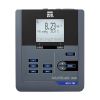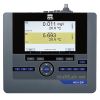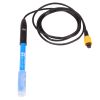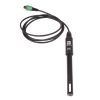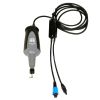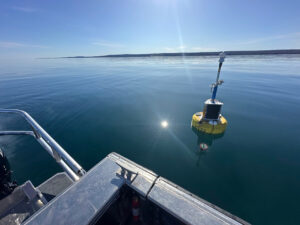YSI MultiLab 4010-3W Three Channel Benchtop Meter
The YSI MultiLab 4010-3W is ideal as a pH meter, ORP meter, conductivity meter, or BOD meter, both as a stand-alone device or as a combination meter for those parameters in the laboratory.
Features
- Three channel input for pH, ORP, DO/BOD, or conductivity
- 500 data set storage in manual mode; 10,000 data sets in automatic logging mode
- Large, easy to read color display
- Free ground shipping
- Expedited repair and warranty service
- Lifetime technical support
- More
Overview
The YSI MultiLab 4010-3W is ideal as a pH meter, ORP meter, conductivity meter or BOD meter as a stand-alone or combination meter for measuring parameters in the laboratory.
IDS Intelligent Digital Sensors
The IDS sensors automatically store their unique serial number and calibration data. In addition, they also digitally process the measurement signal. The sensors can be moved from instrument to instrument and maintain their calibration data and transmit this information to the new instrument.
- Digital sensor recognition, processing and data transfer
- Includes self-stirring BOD, pH, ORP and conductivity sensors
- BOD probe uses optical dissolved oxygen technology and includes a guarded sensor tip
Benefits
- Use non-IDS (other manufacturer's) pH or ORP sensors with a simple adapter for DIN or BNC
- Intelligent, digital sensors - plug and play sensors
- GLP traceability (sensors store serial # and calibration data)
- Antibacterial keypad
- USB connectivity to manage data
- 3-year warranty
In The News
Sargassum Surge: How Seaweed is Transforming our Oceans and Coastal Ecosystems
Until recently, Sargassum –a free-floating seaweed–was distributed throughout the Sargasso Sea , the north Caribbean Sea, and the Gulf of Mexico. But in the space of a decade, this seaweed has, as one scientist remarks , “Gone from a nonfactor to the source of a terrible crisis.” Driven by climate change, anomalous North Atlantic Oscillation in 2009-2010 and a glut of anthropogenic pollutants, sargassum has proliferated. Seasonally recurrent mats as deep as 7m now bloom in the “Great Atlantic Sargassum Belt” (GASB), which covers areas of the Atlantic from West Africa to the Caribbean Sea and Gulf of Mexico. Every year, millions of tons wash up along the shores of more than 30 countries . Dr.
Read MoreGreat Lakes Research Center: Designing Targeted Monitoring Solutions
According to the National Oceanic and Atmospheric Administration ( NOAA ), the Great Lakes have more miles of coastline than the contiguous Atlantic and Pacific coasts combined and contain 20 percent of the world's freshwater, making it a critical region to protect and conserve. Continuous monitoring and data-informed resource management are key components of managing waters in the region. Hayden Henderson, a research engineer with the Great Lakes Research Center (GLRC), designs and deploys monitoring platforms throughout the Great Lakes. With a background in environmental engineering, Henderson enjoyed the challenge of creating systems and making them work to obtain difficult, remote measurements.
Read MoreMonitoring Meadowbrook Creek: Real-Time Data Collection in an Urban Creek
Meadowbrook Creek in Syracuse, New York, has been monitored by Syracuse University (SU) faculty and students for over a decade. Originally established by Dr. Laura Lautz in 2012, the early years of the program focused on collecting grab water samples for laboratory analysis and evaluating the impact of urban land use, human activities, and natural processes on water resources. Tao Wen , an Assistant Professor in SU’s Department of Earth and Environmental Sciences, took over the program in 2020 and upgraded the existing systems to include 4G modems that allowed for real-time data viewing. [caption id="attachment_39339" align="alignnone" width="940"] An overview of the Fellows Ave monitoring station along Meadowbrook Creek.
Read More



































